(完整版)非谓语动词语法讲解及练习
非谓语讲义(含答案)
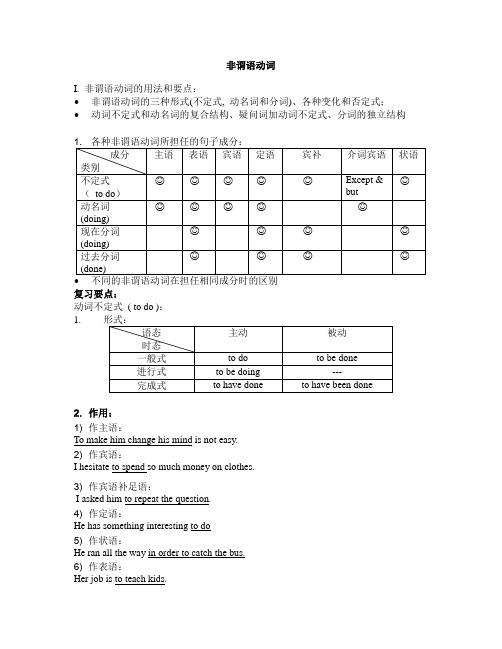
非谓语动词I. 非谓语动词的用法和要点:•非谓语动词的三种形式(不定式, 动名词和分词)、各种变化和否定式;•动词不定式和动名词的复合结构、疑问词加动词不定式、分词的独立结构复习要点:动词不定式( to do ):1.2.作用:1)作主语:To make him change his mind is not easy.2)作宾语:I hesitate to spend so much money on clothes.3)作宾语补足语:I asked him to repeat the question.4)作定语:He has something interesting to do5)作状语:He ran all the way in order to catch the bus.6)作表语:Her job is to teach kids.注意要点:II. 动名词:1. 形式:2作用;1)作主语:Helen's being late for school made me annoyed.2)作宾语:My sister practises playing the piano every day.3) 作定语:The sleeping car is quite comfortable.4) 作表语:His job is teaching English.注意要点:非谓语动词二III. 分词1形式:分词可分现在分词和过去分词,但按时间和语态又可分为以下五种,各表示不同的意思:2. 作用:1)作定语:The lady carrying a suitcase is Ms Wang.2)作状语;时间状语, 原因状语,条件状语,伴随状语3)作表语:The story is touching.The window is broken.4)作宾语补足语:I found a man sitting in his car.He had the car mended.注意要点:对下列句子做相应的转变:The –ing Participle as Adverbial1.Hearing the good news, we were very glad. (time )e.g. After we heard the good news, we were very glad.2.Being a child, he could not understand it.(reason)As he was a child, he…3.Not knowing that a storm was coming, I went out.(reason)As I did not know that a storm was coming, I…4.Working hard, you will succeed.(condition)If you work hard, …5.He stood there, reading the wall-newspaper. ( accompaniment)He stood there and read the wall-newspaper.--ed participlepared with John’s, your composition this time is not so good.( reason)If your composition is compared with John’s, yours this time is not so good.7.Given time, I’ll revise it and have it typed.( time, condition)If I am given time, I’ll…8.Badly polluted, the water can not be drunk.( reason)As the water is badly polluted, it can not be drunk.9.They looked at each other, troubled. ( accompaniment)They looked at each other and they are troubled.10.As he was an old friend of mine, he told me his own experience in English studies.Being an old friend of mine, …11.If you turn right at the traffic lights, you will see the tall building.Turning right at the traffic lights, you…12.A car accident happened yesterday evening and killed three people.…, killing three people.13.When I opened the door, I saw nobody in the room.Opening the door, I saw nobody….14.Since he does not know how to say it, he made a terrible mistake.Not knowing how to sa y it, he…15.The old woman sat in an easy chair. She listened to the music.…, listening to the music.16.We take off our shoes and walk quietly along the passage.Taking off our shoes, we walk quietly along the passage.17. He is busy because he is preparing a speech.He is busy preparing a speech.18. The children came into the hall. They sang and danced.…, singing and dancing.19. He held the rope with one hand and helped the child with the other.Holding the rope with one hand, he helped the child with the other.20. When water is heated, it changes into steam.Heated, water changes into steam.21. As the child was treated in time, he was saved.Treated in time, the child was saved.22. If she is given time, she will be a good singer.Given time, she will be a good singer.23. When it is compared with what it was, it has improved greatly.Compared with what it was, it has improved greatly.24. As those soldiers were badly wounded, they were taken to the field-hospital.Badly wounded, those soldiers were taken to the field hospital.25. As they were tired out by a day’s hard work, they went to bed early.Tired out by a day’s hard work, hey went to bed early.26. When the balloon was blown away by the wind, it soon disappeared.Blown away by the wind, it soon disappeared.27. They came back and they were feeling excited.They came back, feeling excited/ excited.06高考试题1.______ and happy, Tony stood up and accepted the prize. (06, 全国)A. SurprisingB. SurprisedC. Being surprisedD. To be surprising2. When ______ different cultures, we often pay attention only to the differences without noticing the many similarities. (06, 浙)A. comparedB. being comparedC. comparingD. having compared3. ______ for the breakdown of the school computer network, Alice was in low spirits. (06, 福)A. BlamingB. BlamedC. To blameD. To be blamed4. There have been several new events _______ to the program for the 2008 Beijing Olympic Games.( 06 北)A. addB. to addC. addingD. addedKey: B C B D✧现在分词和过去分词在形式上的区别✧现在分词和过去分词做表语的区别✧现在分词和过去分词做定语的区别✧现在分词和过去分词做宾补的的区别✧现在分词和过去分词做状语的区别固定形式课后测试题1、Finding her car stolen, ____A. a policeman was asked to helpB. the area was searched thoroughlyC. it was looked for everywhereD. she hurried to a policeman for help2、Though ____ money, his parents managed to send him to university.A. lackedB. lacking ofC. lackingD. lacked in3、I really appreciate ____ to relax with you on this nice island.A. to have had timeB. having timeC. to have timeD. to having time4、Fishing is his favorite hobby, and ____.A. he’d like to collect coins as wellB. he feels like collecting coins, tooC. to collect coins is also his hobbyD. collecting coins also gives him great pleasure5、Do let your mother know all the truth. She appears ____ everything.A. to tell to be told C. to be telling D. to have been told。
非谓语动词(动名词、动词不定式)总结及练习(附答案)

非谓语动词(动名词、动词不定式)总结及练习非谓语动词在句子中充当除了谓语....以外其它成份的动词形式,不受人称和数的限制。
在英语中,非谓语动词主要有动名词和动词不定式两种形式。
第一部分动名词1.0动名词是在动词后面+ ing (doing)的形式,把动词变成名词来使用。
比如:live → living, see → seeing, go → going,凡此种种。
2.0 动名词在句子中的成份2.1 动名词做主语e.g. Seeing is believing. seeing为动名词,在句子中做主语Learning Japanese is hard. 为动名词,在句子中做主语2.2 动名词作宾语, 此时多与一些固定的谓语动词作搭配, 见附表e.g. I like reading.He enjoyed living in France.2.3 动名词作介词的宾语,常常与类似如下短语的介词连用,如:dream of, keep awayfrom, be good at, be interested in …e.g. He is interested in drawing. 动名词drawing作in的宾语Please keep away from lying. 动名词lying作from的宾语2.4 动名词作表语e.g. Seeing is believing. 动名词believing作表语My hobby is skating. 动名词skating作表语2.5 动名词作定语, 对修饰的名词形成一种定义e.g. a dining room, a swimming pool, a waiting room…2.6 动名词作状语,逻辑主语须与主句主语报纸一致e.g. Hearing the good news, she couldn’t helping laughing. (时间状语)Having received the letter, I decided to write back. (时间状语)Having been to the Great Wall for many times, he didn’t go last week. (原因状语)Working hard, you will succeed.(条件状语)Though working hard from day to day, he didn’t get rich. (让步状语)2.7 动名词作宾语补足语,常与感官等动词连用e.g. I saw him leavingPlease keep him working.第二部分动词不定式1.0 动词不定式也是一种非谓语动词形式,其结构为“to+动词原形”,其中to不是介词而是动词不定式的符号,动词不定式没有人称和数的变化。
非谓语动词用法精讲(完整版)-(共133张)

● ② 动词-ing形式的完成式一般只用来作状语, 不作定语。两个分词所表示的时间有先后,不 用分词作定语表示先时性。 【误】The temple having been destroyed by the earthquake will be rebuilt soon. 【正】The temple which has been destroyed by the earthquake will be rebuilt soon. 被地 震毁坏的庙宇很快就要重建了。
A. paying B. paid C. to be paid D. being paid
④. The repairs cost a lot ,but it’s money well ________. A.to spend B.Spent C.being spent D.Spending
4、分词作状语
B. hanging
C. hangs
D. being hung
②.Reading is an experience quite different from watching TV; there are pictures _____ in your mind instead of before your eyes.
Do you know anyone having lost a cat? × Do you know anyone who has lost a cat? √
c. 不定式作定语,指将来的时间,与被修饰词 形成主谓、动宾、同位关系或修饰关系。
The next train to arrive was from New York. This is the material ___ in the lab tomorrow.
非谓语动词讲解和练习(附答案)

非谓语动词非谓语动词是英语语法中的一个重要概念,指的是在句子中不能单独作谓语,但又具有动词特征的动词形式。
一、种类非谓语动词主要包括三种形式:不定式(Infinitive)、动名词(Gerund)和分词(Participle)。
1.不定式基本形式是“to + 动词原形”(有时可省略to),例如“to study”、“to play”等。
它具有名词、形容词和副词的特征,可在句中充当主语、宾语、表语、定语、状语和补足语等成分。
To see is to believe.(作主语和表语)I want to learn English.(作宾语)2.动名词形式上是动词原形加-ing,和现在分词的形式一样,如“swimming”、“reading”等。
动名词在句中主要起名词的作用,可充当主语、宾语、表语和定语。
Swimming is my favorite sport.(作主语)I enjoy reading books.(作宾语)3.分词现在分词:也是动词原形加-ing,它既有动词特征,又有形容词和副词特征,可作定语、状语、表语和补足语。
The running boy is my brother.(作定语)Hearing the news, she couldn’t help crying.(作状语)过去分词:通常是动词原形加-ed(规则变化)或有其特殊的不规则变化形式,如“broken”、“written”等。
过去分词常表示被动或完成的意义,同样能充当定语、状语、表语和补足语等成分。
The broken cup is on the table.(作定语)Given more time, I can do it better.(作状语)二、用法区别1.作主语时不定式作主语常表示具体的某一次动作或行为,常用“It + be + 形容词+ (for/of sb.) + to do sth.”这样的结构,It is important for us to learn English well.动名词作主语往往表示抽象的、一般性的行为或概念。
非谓语动词例题讲解及练习
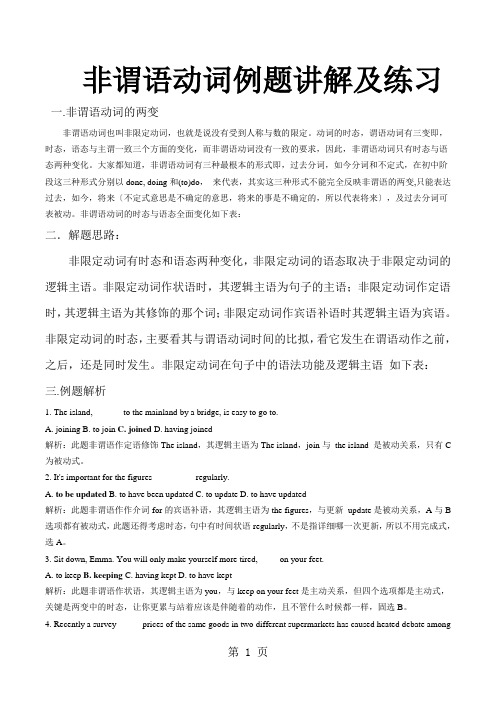
非谓语动词例题讲解及练习一.非谓语动词的两变非谓语动词也叫非限定动词,也就是说没有受到人称与数的限定。
动词的时态,谓语动词有三变即,时态,语态与主谓一致三个方面的变化,而非谓语动词没有一致的要求,因此,非谓语动词只有时态与语态两种变化。
大家都知道,非谓语动词有三种最根本的形式即,过去分词,如今分词和不定式,在初中阶段这三种形式分别以done, doing和(to)do,来代表,其实这三种形式不能完全反映非谓语的两变,只能表达过去,如今,将来〔不定式意思是不确定的意思,将来的事是不确定的,所以代表将来〕,及过去分词可表被动。
非谓语动词的时态与语态全面变化如下表:二.解题思路:非限定动词有时态和语态两种变化,非限定动词的语态取决于非限定动词的逻辑主语。
非限定动词作状语时,其逻辑主语为句子的主语;非限定动词作定语时,其逻辑主语为其修饰的那个词;非限定动词作宾语补语时其逻辑主语为宾语。
非限定动词的时态,主要看其与谓语动词时间的比拟,看它发生在谓语动作之前,之后,还是同时发生。
非限定动词在句子中的语法功能及逻辑主语如下表:三.例题解析1. The island, ______ to the mainland by a bridge, is easy to go to.A. joiningB. to joinC. joinedD. having joined解析:此题非谓语作定语修饰The island,其逻辑主语为The island,join与the island 是被动关系,只有C 为被动式。
2. It's important for the figures _________ regularly.A. to be updatedB. to have been updatedC. to updateD. to have updated解析:此题非谓语作作介词for的宾语补语,其逻辑主语为the figures,与更新update是被动关系,A与B 选项都有被动式,此题还得考虑时态,句中有时间状语regularly,不是指详细哪一次更新,所以不用完成式,选A。
非谓语动词(附练习题及答案)
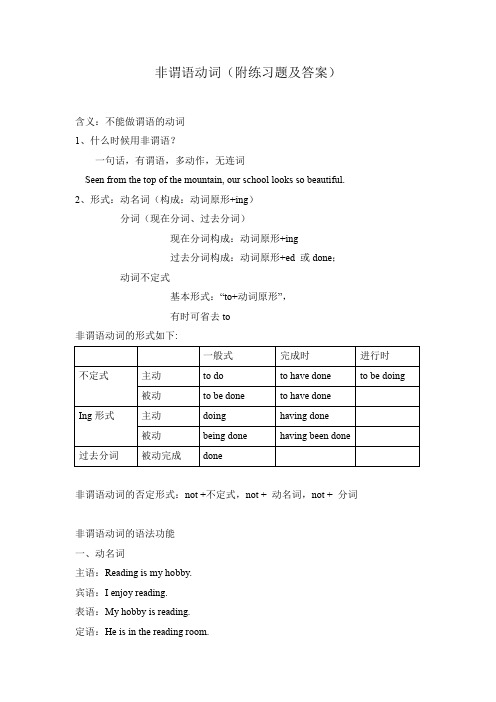
非谓语动词(附练习题及答案)含义:不能做谓语的动词1、什么时候用非谓语?一句话,有谓语,多动作,无连词Seen from the top of the mountain, our school looks so beautiful. 2、形式:动名词(构成:动词原形+ing)分词(现在分词、过去分词)现在分词构成:动词原形+ing过去分词构成:动词原形+ed 或done;动词不定式基本形式:“to+动词原形”,有时可省去to非谓语动词的形式如下:非谓语动词的否定形式:not +不定式,not + 动名词,not + 分词非谓语动词的语法功能一、动名词主语:Reading is my hobby.宾语:I enjoy reading.表语:My hobby is reading.定语:He is in the reading room.二、现在分词表语:The book is interesting.定语:It's an interesting book.状语:He sat there, reading a newspaper.宾补:I saw him standing there.三、过去分词表语:They were excited at the news.定语:There are a few minutes left.状语:Seen from the hill, our school looks beautiful.宾补:I saw him beaten by Tom.四、不定式主语:To catch the train is impossible.宾语:They need to look at a map.表语:My work is to clean the classroom.定语:I have lots of work to do.状语:I am sorry to trouble you.宾补:He told me to close the door.考点动名词考点一:动名词作宾语的动词1.admit doing sth. 承认做某事2.advise/suggest doing sth. 建议做某事3.allow/permit doing sth. 允许做某事4.appreciate doing sth. 感激做某事5.avoid doing sth. 避免做某事6.consider doing sth. 考虑做某事7.delay/put off doing sth. 推迟做某事8.deny doing sth. 否认做某事9.like(enjoy)/dislike doing sth.喜欢/不喜欢做某事10.escape doing sth. 逃脱做某事11.fancy doing sth. 喜欢做某事12.finish doing sth. 完成做某事13.forbid /prohibit doing sth. 禁止做某事14.forgive doing sth. 原谅做某事15.give up doing sth. 放弃做某事16.imagine doing sth. 想象做某事17.keep doing sth. 保持做某事18.mention doing sth. 提及做某事19.mind doing sth. 介意做某事20.miss doing sth. 错过做某事21.practice doing sth. 练习做某事22.prevent doing sth. 阻止做某事23.report doing sth. 报告做某事24.risk doing sth. 冒险做某事25.stop doing sth. 停止做某事词组:devote to,get down to,be accustomed to confess to have trouble/difficulty (in)doing sth.例题:He enjoys ___ pop music while I prefer classical music.A. listen toB. to listenC. listeningD. listening to补充知识:及物动词:后面必须跟宾语的动词,像buy,reach,give等。
(完整版)非谓语动词语法讲解及练习
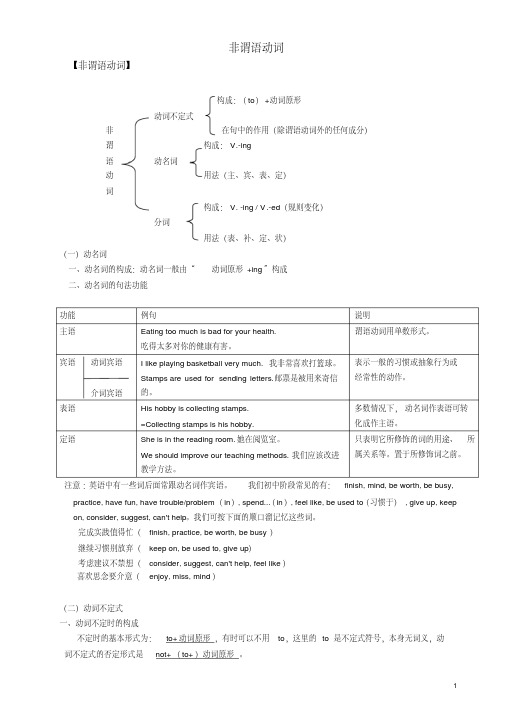
非谓语动词【非谓语动词】构成:(to)+动词原形动词不定式非在句中的作用(除谓语动词外的任何成分)谓构成:V.-ing语动名词动用法(主、宾、表、定)词构成:V. -ing / V.-ed(规则变化)分词用法(表、补、定、状)(一)动名词一、动名词的构成:动名词一般由“动词原形+ing”构成二、动名词的句法功能功能例句说明主语Eating too much is bad for your health.吃得太多对你的健康有害。
谓语动词用单数形式。
宾语动词宾语介词宾语I like playing basketball very much.我非常喜欢打篮球。
Stamps are used for sending letters.邮票是被用来寄信的。
表示一般的习惯或抽象行为或经常性的动作。
表语His hobby is collecting stamps.=Collecting stamps is his hobby. 多数情况下,动名词作表语可转化成作主语。
定语She is in the reading room.她在阅览室。
We should improve our teaching methods.我们应该改进教学方法。
只表明它所修饰的词的用途、所属关系等。
置于所修饰词之前。
注意:英语中有一些词后面常跟动名词作宾语。
我们初中阶段常见的有:finish, mind, be worth, be busy, practice, have fun, have trouble/problem(in), spend...(in), feel like, be used to(习惯于), give up, keep on, consider, suggest, can't help。
我们可按下面的顺口溜记忆这些词。
完成实践值得忙(finish, practice, be worth, be busy)继续习惯别放弃(keep on, be used to, give up)考虑建议不禁想(consider, suggest, can't help, feel like)喜欢思念要介意(enjoy, miss, mind)(二)动词不定式一、动词不定时的构成不定时的基本形式为:to+动词原形,有时可以不用to,这里的to 是不定式符号,本身无词义,动词不定式的否定形式是not+(to+)动词原形。
(完整版)非谓语动词作补语讲解及练习
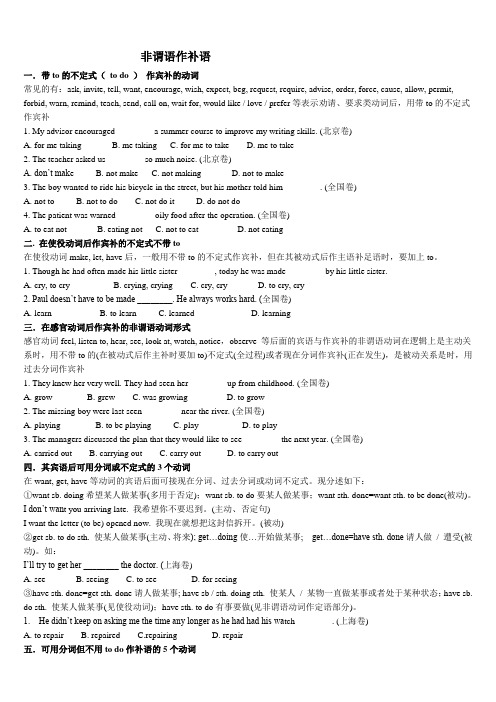
非谓语作补语一.带to的不定式(to do )作宾补的动词常见的有:ask, invite, tell, want, encourage, wish, expect, beg, request, require, advise, order, force, cause, allow, permit, forbid, warn, remind, teach, send, call on, wait for, would like / love / prefer等表示劝请、要求类动词后,用带to的不定式作宾补1. My advisor encouraged ________ a summer course to improve my writing skills. (北京卷)A. for me takingB. me takingC. for me to takeD. me to take2. The teacher asked us ________ so much noise. (北京卷)A. don’t mak eB. not makeC. not makingD. not to make3. The boy wanted to ride his bicycle in the street, but his mother told him ________. (全国卷)A. not toB. not to doC. not do itD. do not do4. The patient was warned ________ oily food after the operation. (全国卷)A. to eat notB. eating notC. not to eatD. not eating二. 在使役动词后作宾补的不定式不带to在使役动词make, let, have后,一般用不带to的不定式作宾补,但在其被动式后作主语补足语时,要加上to。
- 1、下载文档前请自行甄别文档内容的完整性,平台不提供额外的编辑、内容补充、找答案等附加服务。
- 2、"仅部分预览"的文档,不可在线预览部分如存在完整性等问题,可反馈申请退款(可完整预览的文档不适用该条件!)。
- 3、如文档侵犯您的权益,请联系客服反馈,我们会尽快为您处理(人工客服工作时间:9:00-18:30)。
非谓语动词【非谓语动词】构成:(to)+动词原形动词不定式非在句中的作用(除谓语动词外的任何成分)谓构成:V.-ing语动名词动用法(主、宾、表、定)词构成:V. -ing / V.-ed(规则变化)分词用法(表、补、定、状)(一)动名词一、动名词的构成:动名词一般由“动词原形+ing”构成二、动名词的句法功能注意:英语中有一些词后面常跟动名词作宾语。
我们初中阶段常见的有:finish, mind, be worth, be busy, practice, have fun, have trouble/problem(in), spend...(in), feel like, be used to(习惯于), give up, keep on, consider, suggest, can't help。
我们可按下面的顺口溜记忆这些词。
完成实践值得忙(finish, practice, be worth, be busy)继续习惯别放弃(keep on, be used to, give up)考虑建议不禁想(consider, suggest, can't help, feel like)喜欢思念要介意(enjoy, miss, mind)(二)动词不定式一、动词不定时的构成不定时的基本形式为:to+动词原形,有时可以不用to,这里的to 是不定式符号,本身无词义,动词不定式的否定形式是not+(to+)动词原形。
1. 不定式作主语动词不定式作主语时,常用it作形式主语,而将真正的主语放在句末如:To learn English well is useful.→It is useful to learn English well.It’s important for us to protect the environment.注意:在kind,good,nice,clever等表示人的品质的形容词后,不用for而用of。
如:It's very kind of you to help me. 你帮助我真是太好啦。
It's very clever of you to do like that. 你那样做真是太聪明啦。
2. 不定式作宾语① 有些谓语动词后只能用不定式作宾语,常见的这类词是表示命令、打算或希望的,如:would like, like, want, wish, hope, decide, plan, expect等。
如:Would you like to see a film this evening? 你今晚想去看电影吗?②在find, think后跟不定式作宾语时,常用it代替,而将真正的宾语放在后面。
如:I find it easy to read English every day.③常见的一些不带to的动词不定式Why not do..., Why don't you do..., had better(not)do..., would rather do,could/would/will you please(not)do...I would rather stay in the room.我宁愿待在房间里。
3. 不定式作宾语补足语不定式作宾语补足语时与宾语有逻辑上的主谓关系。
如:Lucy asked him to turn down the radio. 露西让他关小收音机。
tell, ask, want, allow, get, would like, encourage后常跟动词不定式作宾语补足语。
如:My mother encourages me to learn Japanese. 我妈妈鼓励我学日语。
注意:还有一些使役动词和感官动词也用不定式作宾补,这时不定式要省略to。
这些动词有:一感(feel)、二听(hear, listen to)、三让(let, make, have)、四看(look at, see, watch, notice)。
但变被动语态时,必须加上My friends were made to work the whole night by the boss. 老板让我的朋友们工作了一整夜。
4. 不定式作定语①不定式作定语时,应放在名词之后。
它与名词有逻辑上的动宾关系。
②如果是不及物动词,且与所修饰的词之间有动宾关系,要在不定式后加上适当的介词。
There is nothing to worry about. 没有什么可担心的。
5.不定式常和疑问词what, which, when, where, how连用,相当于一个宾语从句。
如:The teacher is telling the students what to do. 老师正告诉学生们做什么。
He didn't know where to go. 他不知道去哪里。
例题( )1. Tom's mother told him _______ eating too much meat.A: stopping B: to stop C: stops D: stopped( )2. We don't know ________ it next. Let's go and ask Mr. Li.A: what to do B: to do what C: whether to do D: to do whether( )3. How kind you are! You always do what you can _______me.A: help B: helping C: to help D: helps( )4 Drivers shouldn't be allowed ________after drinking, or they will break the law.A: drive B: driving C: to drive( )5. Water Park is a good place________.A: to have fun B: have fun C: having fun D: to have a fun( )6. Take time to relax by listening to music, reading a book or just spending some time alone. Relaxing allows you _______to your studies with more energy.A: return B: to return C: returning( )7. Nick, would you mind ________those old jeans? They look terrible.A: not to wear B: not wear C: wearing not D: not wearing( )8. —_______ a volunteer is great.—I think so. Some of us want _______volunteers for the London Olympics.A: Being;being B: To be;being C: Being;to be D: To be;to be( )9.—Don't forget ______your history and politics books tomorrow morning.—Thanks. I won't.A: bring B: to bring C: bringing( )10.—What about _______a rest?—OK. Let's go out and have a walk.A: to take B: takes C: taking( )11. —I like this set of sofa so much, but I don't know ______it in my small house.—You're supposed to put it in the living room.A: where to put B: why to put C: how to put( )12. While we were running on the playground, Jack suddenly stopped ______and lay on the ground, so we all stopped _______what was wrong with him.A: to run; to see B: running; seeing C: running; to see( )13. May I have a rest? I have already finished ______the report.A: write B: writing C: to write D: written( )14.—I feel a bit hungry now.—Why not _______for dinner with us?A: go B: did you go C: to go D: do you go练习( )1. Granny often tells us ________water in our daily life.A: save B: saving C: to save D: saves( )2. Richard turned off the computer after he had finished ________the email.A: write B: to write C: writing D: wrote( )3.—We can use QQ to chat with each other on the Internet.—Really? Will you please show me ______it?A: how to use B: what to use C: how can I use D: what can I use( )4.—Where's your brother now,Bob?—I saw him ________ in the street a moment ago and I told him _______.A: playing;don't do so B: playing;not to do so C: play;to do so( )5. As teenagers, we're old enough _______with housework. We can help set the table, wash the dishes and clean our own rooms.A: to help B: helping C: helped( )6. Nancy is really a hard-working student. We often see her _______books in the classroom.A: read B: to read C: reads( )7 Mrs. Smith made her students _______the compositions three times a week.A: write B: to write C: written D: writing( )8.Tom often makes his sister , but yesterday he was made by his sister.A: cry; to cry B: to cry; cry C:cry; cry D: to cry; to cry( )9. You'd better _______ too much time playing computer games.A: don't spend B: not to spend C: to not spend D: not spend( )10. More and more young people are trying to do something _______the old.A: served B: to serve C: serve D: serves( )11. Why not _______ an English club to practice _______ English?A. to join; to speakB. join; speakingC. join; to speakD. to join; speaking( )12. When we came to the gate, he stopped _________ me go in first.A. to letB. to tellC. to allowD. to ask( )13. She saw some boys _________ soccer on the playground when she was on the way to the classroom.A. playedB. to playC. playing( )14. —How about going shopping this weekend, Peter?—Sorry, I prefer _________ rather than _________.A. to stay at home; go outB. to go out; stay at homeC. staying at home; go outD. Going out; stay at home( )15. It's a good habit _________ every day.A. to keep doing exerciseB. to stay up lateC. to make much noiseD. to too much( )16. —It's hot. Would you mind my _________ the window.—__________. Do it as you like, please!A. to open; OKB. opening; Certainly notC. closing; Of courseD. Open; Good idea ( )17. Who do you think you'd like _________ with you, a boy or a girl?A. to let to goB. letting to goC. to let goD. let go( )18. The house was so dirty. They decided _________.A. clean it upB. to clean it upC. clean up itD. cleaning up( )19. I heard someone _______ the door and .A. open; come inB. to open; to come inC. open; come intoD. to open; to come into ( )20. The girl was heard _________ the piano in the next room.A. playsB. to playC. playedD. playI.选择填空。
